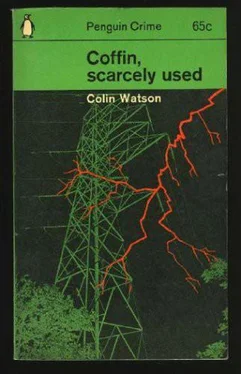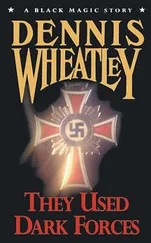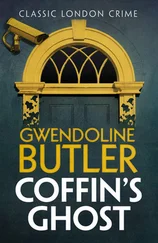Coffin, Scarely Used
Colin Watson
Chapter One
Considering that Mr Harold Carobleat had been in his time a town councillor of Flaxborough, a justice of the peace, a committeeman of the Unionist Club, and, reputedly, the owner of the towns’ first television aerial, his funeral was an uninspiring affair.
And considering the undoubted prosperity of Mr Carobleat’s business establishment, the ship brokerage firm of Carobleat and Spades, its closing almost simultaneously with the descent of its owner’s coffin into a hole in Heston Lane Cemetery was but another sign that gloria mundi transits as hastily in Flaxborough as anywhere else.
There were those, of course, who were pleased to interpret both circumstances otherwise than philosophically. They hoped for scandal, even posthumous scandal, to compensate for what had been, by their standards, a singularly uneventful burying and the tantalizingly straightforward eclipse of a well-known local business. They were in no mood to accept the explanation that a firm with only one principal (Mr Spades was a fiction that derived from some good-will arrangement made by Mr Carobleat when he took over the concern in 1935) could reasonably be expected to share his demise.
But, then, uncharitable speculation was no novelty in Flaxborough. It flecked the canvas of community life and, like the blemish that invites anxious examination of an old master, made it the more interesting.
What was wrong with the funeral?
Well, for one thing, there were only three cars. Not that there really needed to be any at all. The tall, sombre-faced house, standing behind its looming hedges at the far end of the built-up portion of Heston Lane, was little more than fifty yards from the cemetery entrance. But that wasn’t the point. Even had the grave yawned in the middle of Mr Carobleat’s own front lawn, propriety would have demanded a cortege of Daimlers to go once round the drive before unloading at the point from which it had set out.
No, three cars meant that the austerity suggested in the Flaxborough Citizen announcement of “funeral private; friends meet at cemetery” had been deliberately put into effect. The town, conscious of its entitlement to make the best of the only genuine “engagement elsewhere” that had ever kept Mr Carobleat from serving its interests, felt snubbed. It resented such flagrant unostentation.
There was no service at either church or chapel. Nor was there held that funeral equivalent to a wedding reception, the nameless function designed to thaw out the feet of mourning and to enable grief to be beguiled with a few preliminary guesses about the will.
At the end of what brief, colourless ceremony there had been at the graveside, the few representatives of the council and one or two other organizations with which Harold Carobleat had been associated each solemnly grasped the black-gloved hand of Joan Carobleat, relict, murmured a kindly encouragement and departed. Mrs Carobleat’s face remained expressionless but she thanked them quietly one by one. When all had passed, she turned and awaited Mr Jonas Bradlaw, undertaker, who personally drove her home in the second car.
The subsequent cold meal was served only to a few of the former broker’s closest friends. There was his medical adviser (if ‘adviser’ remains an appropriate term on such an occasion), Dr Rupert Hillyard; Mr Rodney Gloss, his solicitor; Mr Marcus Gwill, proprietor of the Flaxborough Citizen and the Carobleats’ next-door neighbour; and Mr Bradlaw—for even amongst one’s friends one may number those of whose professional services one does not wish to take immediate advantage, at whatever discount.
No relatives arrived to sour the occasion, for the Carobleat family tree had been so effectively pruned by childless marriage, chronic spinsterism, ill choice of occupation in two wars, and an hereditary susceptibility to heart disease that Harold had been for some time the last twig on the dead trunk of his ancestry.
The only outsider to be entertained was a young reporter from the Citizen , and he was quietly taken into an alcove by Mr Gwill and given by him a succinct biography and a list of mourners. There had been, by request, no flowers.
So passed from Flaxborough a man who, in Mr Gwill’s carefully chosen phrases, had been ‘a respected citizen of the town since he took up residence twenty-two years ago and applied himself to the expansion of a long-established local business; a notable social worker, particularly in the sphere of moral welfare as it affected the good name of our small maritime community; and an administrator who will long be remembered for his contribution to the organizing of the war effort in this area.’
As the blinds of the tall, withdrawn Edwardian villas on Heston Lane were released from the tension of indicating begrudged respect for Three-Car Carobleat, a police inspector strolled, apparently aimlessly, past the gates of Karachi, the homestead so lately vacated by Harold. Having noticed that Mr Bradlaw’s second Daimler was still on the drive, he sauntered on a little way and eventually took a bus back to the town. The following day, he reasoned, would be a more seemly occasion for a tactful, informal talk with Mrs Carobleat. And, indeed, the inspector did call the next day. But he learned nothing to his purpose.
It was a little more than six months later that the good residents of Heston Lane found themselves constrained to darken their front rooms once again.
This time, however, the occasion was one of much more intriguing possibilities. Who would have thought that one of the mourners at Mr Carobleat’s funeral in May would take a December journey in the same direction—and from the very next house, too? And what was one to make of the curious circumstances of this new death?
The same question was occupying the mind of the reporter who had stood respectfully in the big, expensively furnished drawing-room of Karachi, matching his shorthand against Mr Gwill’s recital of Harold Carobleat’s civic career.
This reporter now sat at his desk in the barn-like office above the clattering case-room, and wondered what sort of an obituary one composed in respect of one’s own employer. Judging from the lavish record of every public word and act of Mr Gwill that the Citizen had been obliged to print in his lifetime, it seemed that the announcement of the catastrophe of his death called for the efforts of Aeschylus, Jonson, Wordsworth and Barnum and Bailey, all rolled into one.
Yet how could heroic prose (‘...the entire community, deeply shocked and tragically aware of the loss it has sustained...’) be bent to make room for factual details so bizarre as those of the accident in Calendar’s Field?
He stared impotently at the blank copy paper before him and received only the mental image of Mr Marcus Gwill, his pale blue eyes like ice fragments beneath the unsympathetic cliff of his forehead, gazing coldly across Flaxborough from the extraordinary vantage point of the crossbar of an electricity pylon.
Across the narrow corridor from the general editorial office where inspiration eluded the epitaph-writer was a smaller, warmer and much, much more comfortable room. Behind its heavy mahogany table sat a sharply featured man with busy, distrustful eyes and a wide slit of a mouth, designed, one would have thought, for the dual purpose of loud talk and voracious feeding.
In fact, however, Mr George Lintz, editor of the Flaxborough Citizen , made miserly use of his most extravagant feature, for he ate little and spoke only one-sidedly, as though half his lips had been sewn up to prevent waste of words and body heat.
On this misty, yellowish winter morning, Lintz was staring fixedly ahead through one of the three tall windows that faced him. He lightly held the telephone with the mouthpiece down under his chin in the manner of the newspaper man. He remained silently attentive for a full minute, then, in sudden exasperation, barked “Nonsense!” and shifted forward in his chair.
Читать дальше












